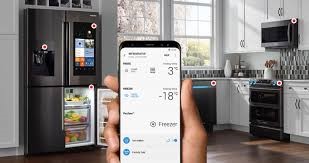
In the era of rapid technological advancement, smart appliances are becoming an integral part of modern homes. These innovative devices offer a seamless blend of convenience, efficiency, and connectivity, transforming everyday tasks into effortless experiences. This blog explores the world of smart appliances, highlighting their key features, benefits, and how they are revolutionizing the way we live.
1. What Are Smart Appliances?
Smart appliances are devices equipped with advanced technologies that enable them to connect to the internet and other devices. They can be controlled remotely, often through a smartphone or tablet, and can interact with other smart devices in your home. Examples include smart refrigerators, washing machines, ovens, thermostats, and even coffee makers.
2. Key Features of Smart Appliances
Remote Control and Monitoring:
- Control from Anywhere: Manage your appliances from anywhere using a smartphone app. Start your washing machine while at work or preheat your oven on your way home.
- Real-Time Monitoring: Receive updates and notifications about the status of your appliances. Know when your laundry is done or if your refrigerator door is left open.
Voice Activation:
- Integration with Virtual Assistants: Smart appliances can be controlled using voice commands through virtual assistants like Amazon Alexa, Google Assistant, or Apple’s Siri. You can ask your assistant to start the dishwasher, adjust the thermostat, or check how much time is left on the oven timer.
- Hands-Free Convenience: Voice activation allows you to perform tasks without physically interacting with the appliance, providing convenience when your hands are full or when multitasking.
Energy Efficiency:
- Optimized Energy Use: Smart appliances often come with energy-saving features and can optimize their operation based on real-time energy data, reducing overall energy consumption.
- Energy Monitoring: Track and monitor the energy usage of your appliances in real-time. This can help you identify energy hogs and make adjustments to reduce consumption.
Advanced Diagnostics and Maintenance:
- Self-Diagnosis: Smart appliances can perform self-diagnosis and alert you to potential issues before they become major problems. For instance, a smart washing machine might detect an imbalance and notify you to redistribute the load.
- Scheduled Maintenance Reminders: Receive reminders for regular maintenance tasks, such as cleaning filters or scheduling professional servicing, helping to keep your appliances running efficiently.
Customizable and Adaptive Features:
- Personalized Settings: Save customized settings based on your preferences. For example, a smart oven can store your favorite cooking temperatures and times, or a smart washing machine can remember your preferred cycle for different types of laundry.
- Adaptive Learning: Some smart appliances use machine learning to adapt to your habits and preferences over time. A smart thermostat can learn your schedule and temperature preferences to create a more comfortable living environment.
3. Benefits of Smart Appliances
Convenience and Time-Saving:
- Smart appliances streamline household chores, allowing you to manage them with minimal effort. Automated scheduling and remote control features save time and reduce the need for manual intervention.
Cost Savings:
- By optimizing energy and water use, smart appliances can significantly reduce utility bills. Additionally, the ability to monitor and control appliances remotely helps prevent wastage and overuse.
Enhanced Home Security:
- Smart appliances can enhance home security by alerting you to potential issues. For example, a smart smoke detector can send notifications to your phone if it detects smoke, while a smart doorbell can alert you to visitors or potential intruders.
Improved Efficiency:
- With features like load sensing, energy monitoring, and adaptive learning, smart appliances ensure efficient use of resources. This not only saves money but also reduces environmental impact.
Better Health and Safety:
- Smart appliances contribute to a healthier and safer home environment. For example, smart air purifiers can monitor and improve air quality, while smart ovens can prevent overcooking and reduce the risk of kitchen fires.
4. Popular Smart Appliances and Their Features
Smart Refrigerators:
- Internal Cameras: See inside your fridge without opening the door, reducing energy consumption. Some models can also suggest recipes based on the ingredients you have.
- Inventory Management: Track expiration dates and receive notifications when items are about to go bad. Some smart fridges can even create shopping lists for you.
Smart Washing Machines:
- Remote Control: Start, pause, or schedule laundry cycles from your smartphone. Receive notifications when your laundry is done.
- Load Sensing: Automatically adjust water and detergent levels based on the load size, improving efficiency and cleaning performance.
Smart Ovens:
- Voice Control: Preheat, set timers, and adjust cooking settings using voice commands.
- Recipe Assistance: Some smart ovens come with built-in recipe guides and can adjust cooking settings automatically based on the recipe you choose.
Smart Thermostats:
- Adaptive Learning: Learn your schedule and preferences to optimize heating and cooling, reducing energy consumption.
- Remote Access: Adjust the temperature from your smartphone, ensuring a comfortable home environment when you arrive.
Smart Dishwashers:
- Cycle Customization: Choose the right cycle for your load and save your favorite settings for future use.
- Energy and Water Efficiency: Optimize water and energy use based on the load size and dirtiness of the dishes.
5. The Future of Smart Appliances
The future of smart appliances looks promising, with ongoing advancements in artificial intelligence, machine learning, and the Internet of Things (IoT). Here are some trends to watch for:
Integration with Smart Homes:
- Seamless integration with other smart home devices will create a cohesive and interconnected living environment. Appliances will work together to enhance efficiency and convenience.
Increased Automation:
- Greater automation will further simplify household tasks. Appliances will be able to anticipate your needs and perform tasks without requiring manual input.
Sustainability and Eco-Friendliness:
- Future smart appliances will likely focus even more on sustainability, incorporating features that reduce energy and water consumption and minimize environmental impact.
Enhanced User Experience:
- Improved user interfaces and voice recognition technology will make interacting with smart appliances even easier and more intuitive.
Conclusion
Smart appliances are revolutionizing the way we live, offering unparalleled convenience, efficiency, and connectivity. By embracing these advanced technologies, you can simplify your daily routines, save time and money, and create a more comfortable and sustainable home environment. As technology continues to evolve, smart appliances will become an even more integral part of our lives, shaping the future of home living.
Investing in smart appliances is not just about keeping up with the latest trends; it’s about making a long-term commitment to improving your quality of life and reducing your environmental impact. Explore the world of smart appliances and discover how they can transform your home into a smarter, more efficient, and more enjoyable place to live.







